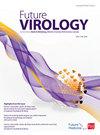Potential roles of core and core+1 proteins during the chronic phase of hepatitis C virus infection
IF 2.1
4区 医学
Q3 VIROLOGY
引用次数: 0
Abstract
The HCV Core protein is a multifunctional protein that interacts with many viral and cellular proteins. In addition to the encapsidation of the viral genome, it can disturb various cellular pathways and impede antiviral cellular responses such as interferon (IFN) production. The Core protein can also disrupt the functions of immune cells against HCV. The Core protein helps viral infection persistency by interfering with apoptosis. The Core+1 protein plays a significant role in inducing chronic HCV infection through diverse mechanisms. We review some of the mechanisms by which Core and Core+1 proteins facilitate HCV infection to chronic infection. These proteins could be considered for designing more sufficient treatments and effective vaccines against HCV.核心蛋白和核心+1蛋白在丙型肝炎病毒感染慢性期的潜在作用
HCV核心蛋白是一种多功能蛋白,与许多病毒和细胞蛋白相互作用。除了病毒基因组的外壳外,它还可以干扰各种细胞途径,阻碍抗病毒细胞反应,如干扰素(IFN)的产生。核心蛋白还可以破坏免疫细胞对抗丙型肝炎病毒的功能。核心蛋白通过干扰细胞凋亡来帮助病毒感染的持续性。核心+1蛋白通过多种机制在诱导慢性丙型肝炎病毒感染中发挥着重要作用。我们综述了核心蛋白和核心+1蛋白促进丙型肝炎病毒感染转变为慢性感染的一些机制。这些蛋白质可用于设计更充分的治疗方法和有效的HCV疫苗。
本文章由计算机程序翻译,如有差异,请以英文原文为准。
求助全文
约1分钟内获得全文
求助全文
来源期刊

Future Virology
医学-病毒学
CiteScore
4.00
自引率
3.20%
发文量
84
审稿时长
6-12 weeks
期刊介绍:
Future Virology is a peer-reviewed journal that delivers essential information in concise, at-a-glance article formats. Key advances in the field are reported and analyzed by international experts, providing an authoritative but accessible forum for this ever-expanding area of research. It is an interdisciplinary forum for all scientists working in the field today.
 求助内容:
求助内容: 应助结果提醒方式:
应助结果提醒方式:


